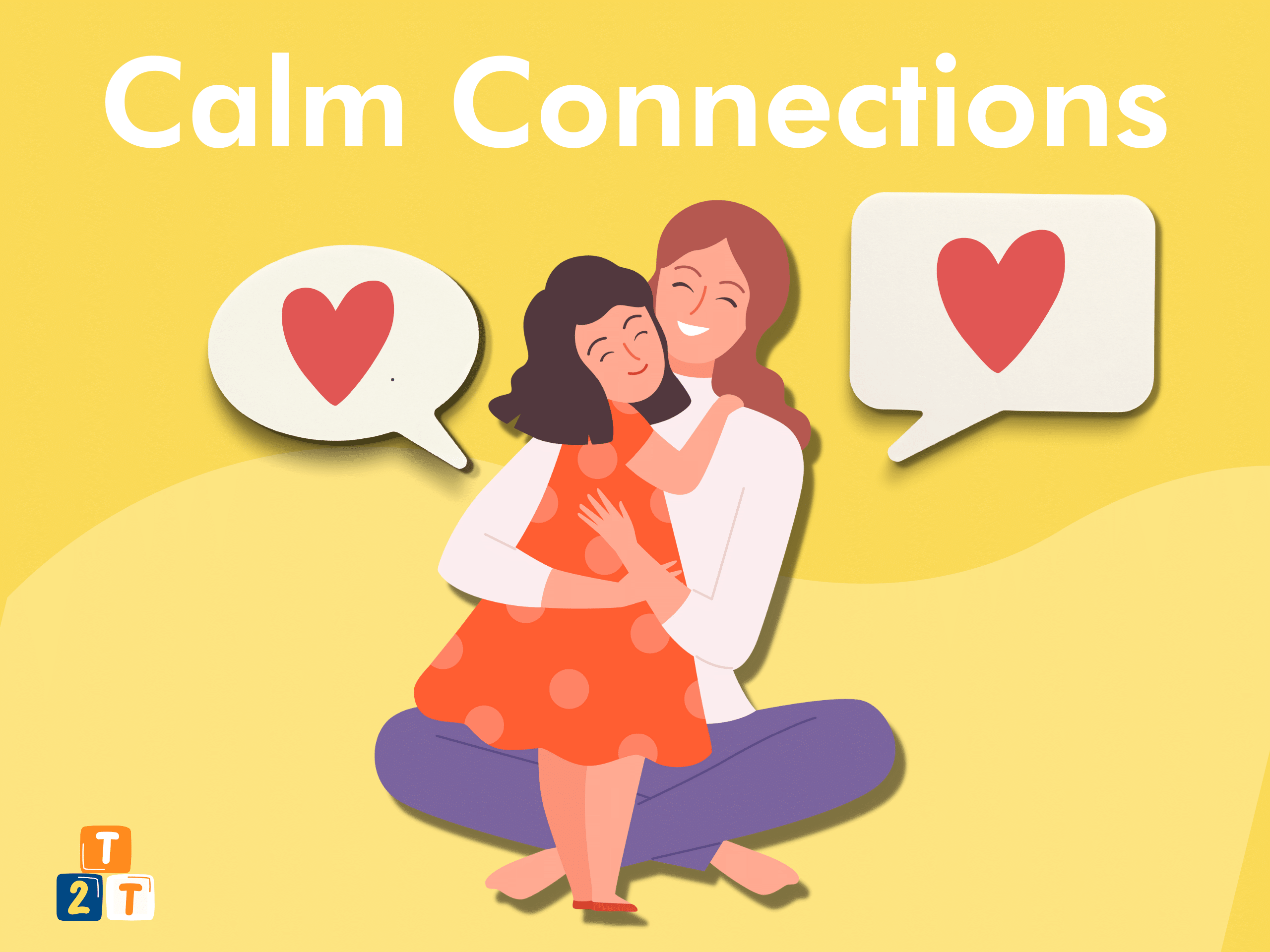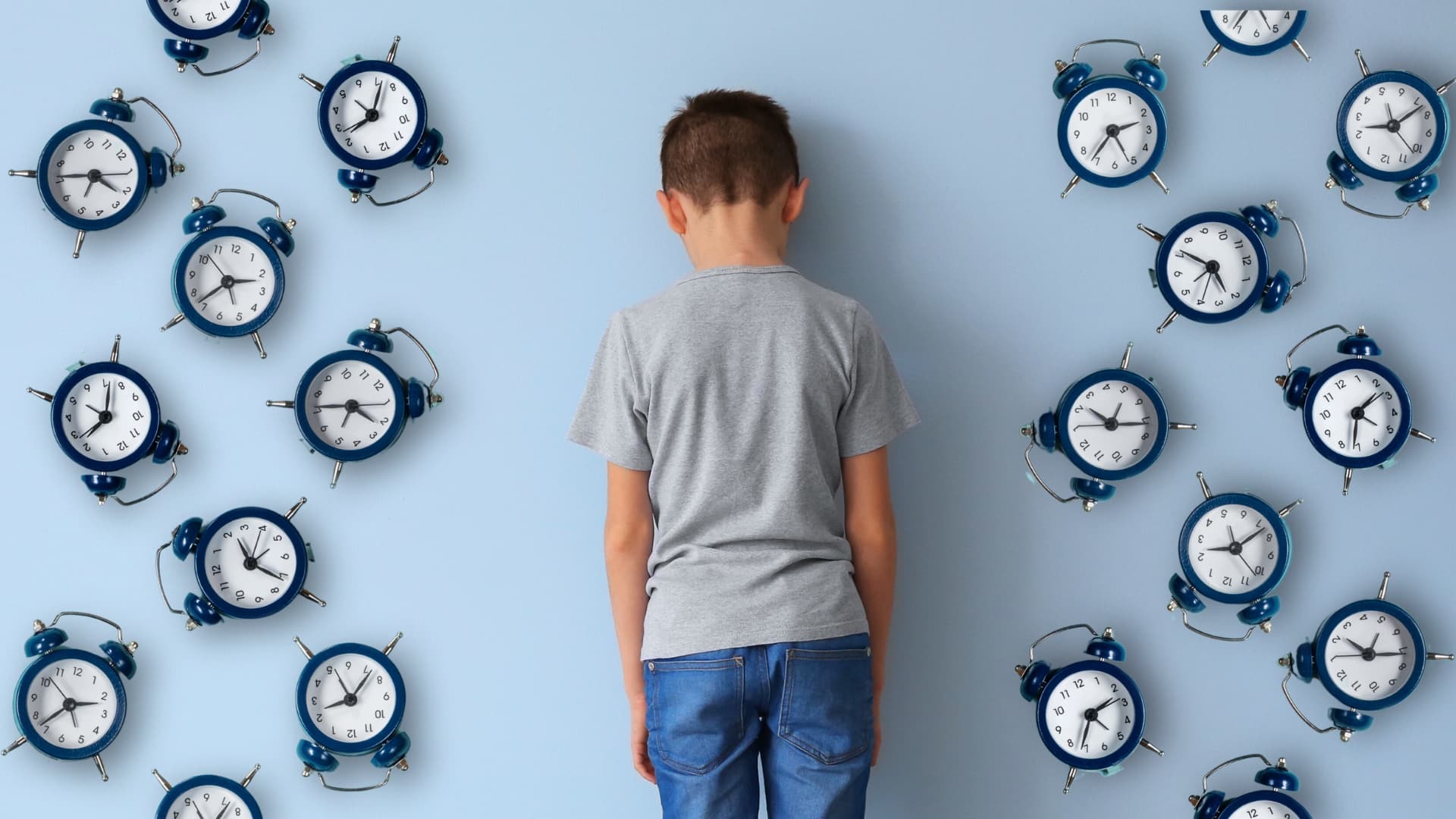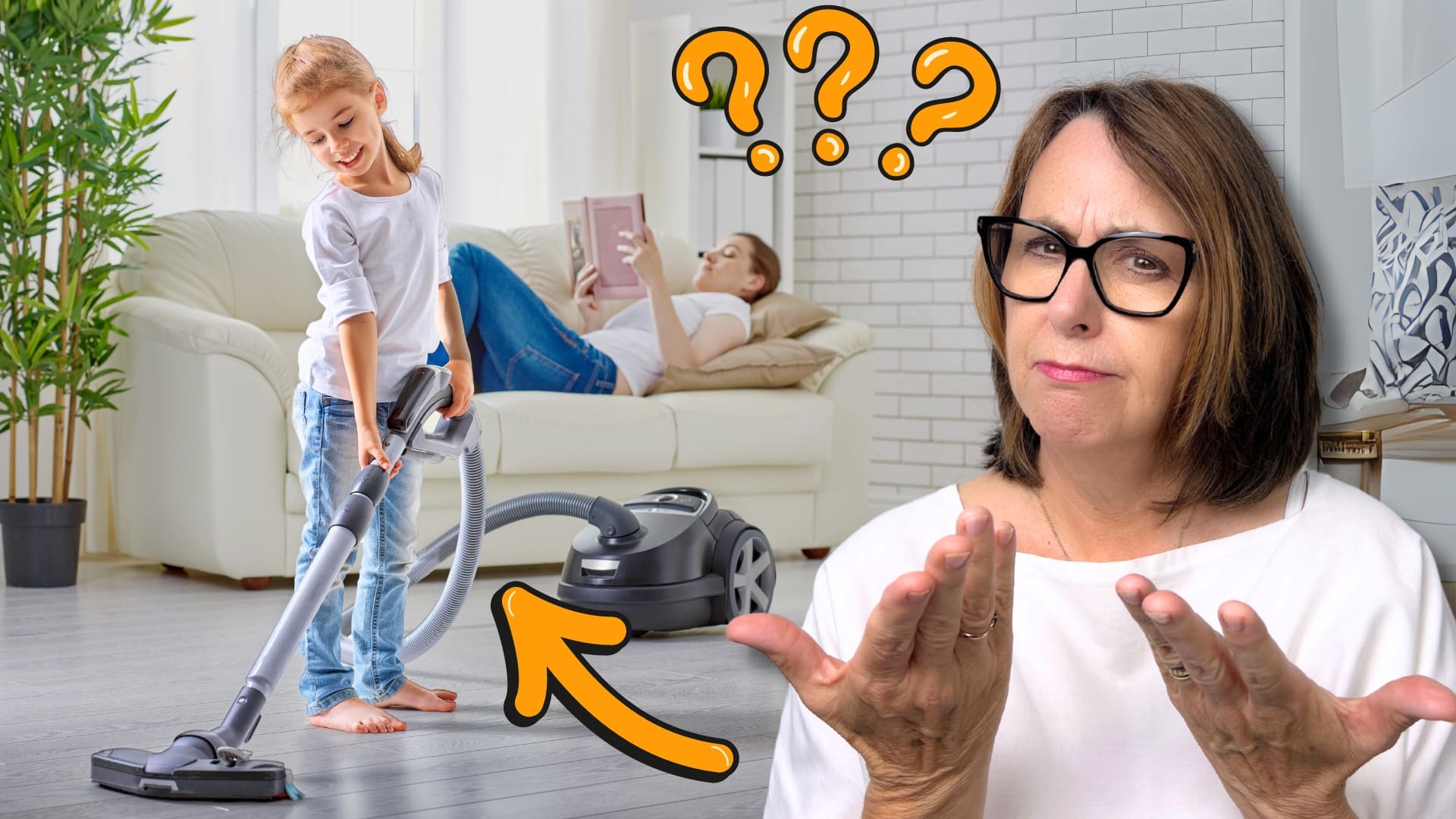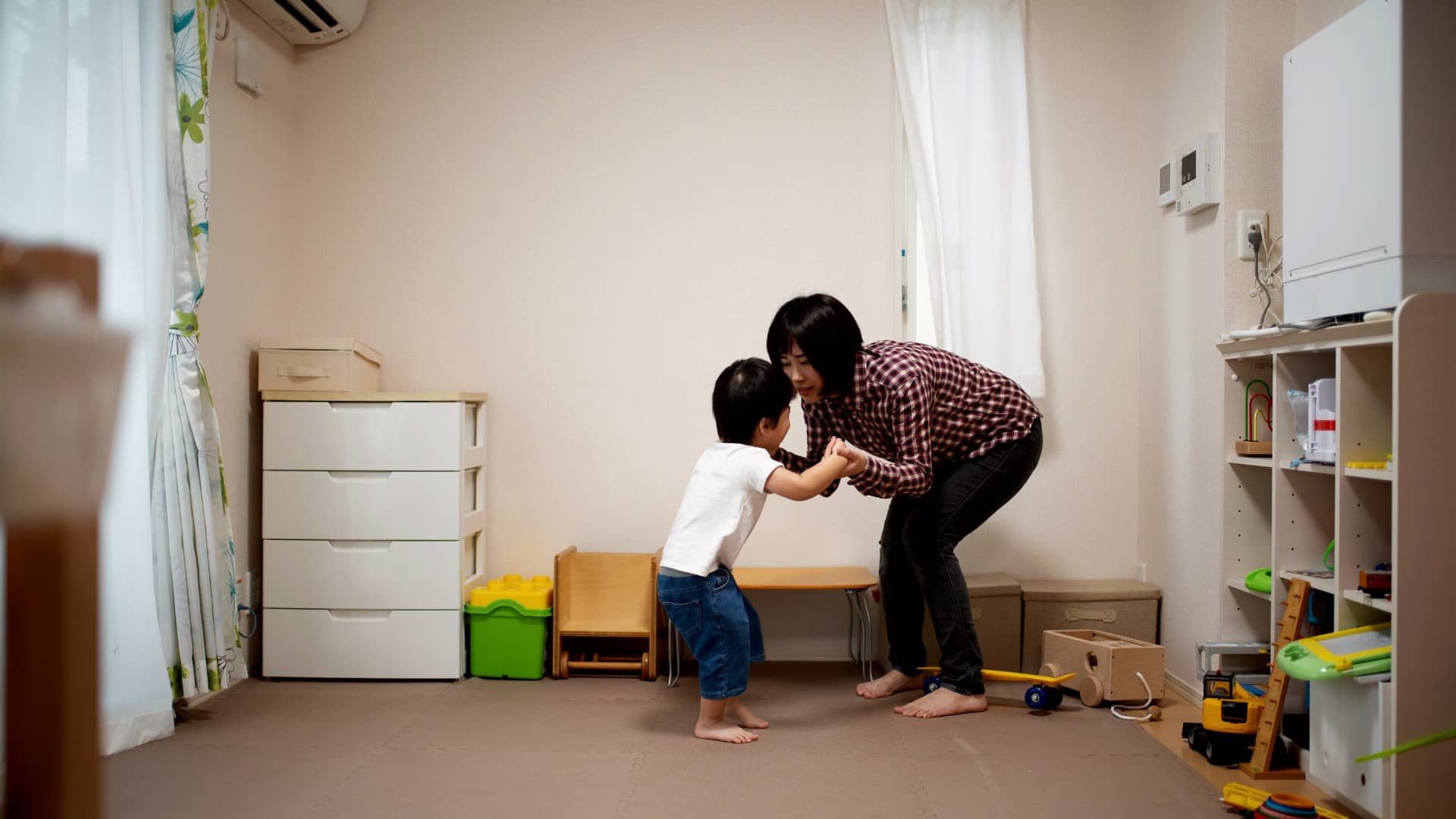Knowing how to discipline a 1 year old can be very tricky… Many children of this age are still quite pliable and calm while others will already start to flex those independent muscles that we normally attribute to two-year-olds.
What makes disciplining a 1 year old so tough is their lack of comprehension and that is why actions for this age group often speak louder than words.
While you will need to teach them to listen to you and learn when they should stop doing something you will have to back this up with a lot of action too.
When Do Babies Understand Discipline?
As a general rule by 9 months, if you use the word “no” firmly and consistently, most will start to grasp its meaning. But in truth, babies will begin to understand discipline at different stages.
And it’s important to use “no” sparingly and focus on using it only to prevent dangerous behaviors (such a touching hot or sharp objects).
However, discipline in its simplest forms can start as soon as 8 months. You’ll know it’s time when your baby starts doing things like biting your arm or pulling off your glasses even after you say “no” followed by laughter.
At this point, they are just exploring and have no concept of the fact that they should not be doing these things. It is our job as parents to gently teach our young children what is acceptable behavior and what is not.

Do I Have To Discipline A 1 Year Old?
1 year olds are naturally curious, and energetic, and the big game changer is that they are probably now mobile.
This means that they can easily get into situations where they do not understand the potential dangers and as a result, they do not take kindly to you stopping them.
Despite the fact that your 1 year old will begin to understand language and put words into context… they will not have a clear grasp of consequences at this stage.
So knowing how to discipline a 1 year old will make these moments a lot easier to handle.
You will find that prevention and redirection are far better ways to guide your little one towards good behavior than disciplining with a string of complex reprimanding and warning words.
Another very important thing to do to cut down on confrontations and power struggles is to toddler-proof your home with baby gates and remove hazardous items.
This will mean that you can avoid having to tell them constantly not to touch or pull them away from dangerous situations.
Always keep dangerous objects out of reach, set limits, and make sure someone is watching your 1 year old at all times.
This will eliminate unnecessary discipline and allow you to concentrate on the importance of laying down the foundations of clear, firm but kind discipline.
Want to stop your children from yelling, shouting & throwing tantrums... Whilst helping them listen to you and building a healthy strong relationship? Look no further than Calm Connections and transform your family’s life for years to come.
- Understand the best way to communicate with your child in different situations, so you feel more confident, relaxed, and in control... even during the most challenging moments. 💖
- Learn how to set clear boundaries and engage your child's cooperation 🌟
- Break free from tantrum cycles and promote healthy alternatives (without using punishment) 🎉
- Learn my trade secrets (collected over 40+ years in the childcare industry) to get your child to listen to you without shouting 🙌
- Promote kindness and honesty to prioritize a respectful relationship with your child ❤️
How To Discipline A 1 Year Old
When dealing with unwanted behavior from your 1-year-old, such as tantrums, hitting, yelling, or general misbehavior, it’s essential to use guidance instead of punishment.
Your 1 year old will be experiencing big feelings and can become easily overwhelmed, so your goal should always be to teach them appropriate communication skills and boundaries while responding to meltdowns or misbehaviors with empathy.
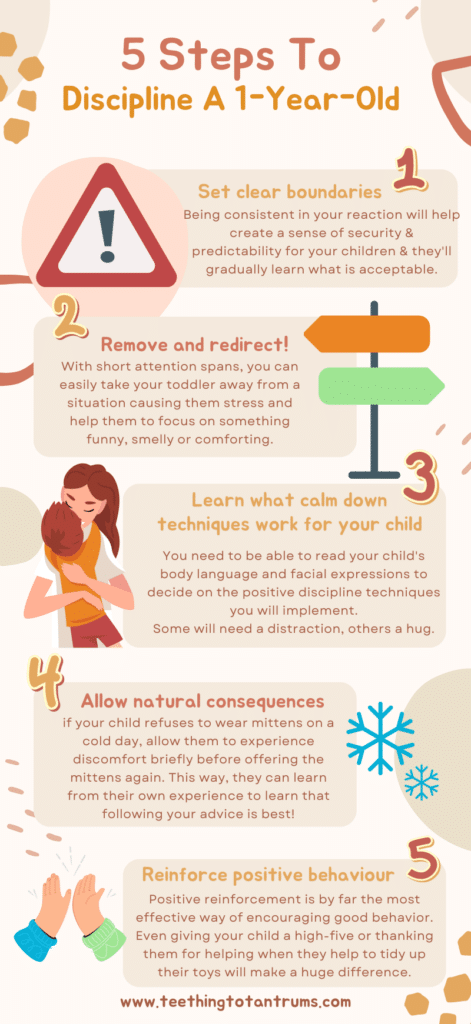
1. Set Clear Boundaries
One of the most effective discipline techniques for knowing how to discipline a 1 year old is to manage misbehavior by setting clear boundaries, limits and consequences.
For instance, if your toddler is biting or hitting, calmly tell them that this is not acceptable and guide them towards appropriate behavior, like using gentle touches.
Make sure to respond to their unwanted behaviors consistently, so your child understands what’s expected of them.
Don’t give in or ignore behavior one day… then forbid it the next.
This will only confuse your little one.
Being consistent in your reaction will help create a sense of security and predictability in their daily lives and they will gradually learn what is acceptable and what is not.
2. Remove And Redirect
Using distractions or humour can help diffuse situations.
For instance, if your 1 year old starts throwing a tantrum, redirect their focus onto positive activities, like playing with a toy or engaging in a game to help you maintain control without resorting to shouting or saying no.
A lighthearted moment can often dispel tension and change the tone too.
This way, you are teaching your 1 year old to focus on healthier activities and fostering a stronger bond with them.
So if things get out of hand or your 1 year old has a meltdown or tantrum that they are struggling to control, try employing this strategy of removing them from the situation.
Luckily, 1-year-olds are distracted quite easily so this method can often stop the tantrum in its tracks!
3. Learn What Works For Your Child
I know this is easier said than done when learning how to discipline a 1 year old…
But as Claire Lerner (a child development specialist at Zero to Three) says… “You need to know your own child”.
Put simply this means that some 1 year olds will calm down quickly through distraction while others will need a big hug.
You need to be able to read your child’s body language and facial expressions to decide on the positive discipline techniques you will implement.
If, however, a tantrum is lengthy… You will need to remove your child from the situation and gently explain what’s going on.
For example, saying “We can’t stay in the store if you continue screaming” and waiting until they calm down before going back to shopping.
4. Natural Consequences
For this age group, I would always opt for natural consequences instead of punishment.
For example, if your child refuses to wear mittens on a cold day, allow them to experience discomfort briefly before offering the mittens again.
This way, they can learn from their own experience to understand the logical consequences and hopefully learn that following your advice is best!
5. Reinforce Positive Behaviour
Knowing how to discipline a 1 year old is knowing how to reinforce positive behaviour through praise and rewards, like giving your child a high-five or thanking them for helping when they help to tidy up their toys.
Positive reinforcement is by far the most effective way of encouraging good behavior more consistently.
Remember, it’s crucial to always maintain a confident, knowledgeable, and clear tone of voice when addressing your toddler to set a proper example and create a stable environment for their growth and development.
If you lose your temper, shout and use harsh words they will think that is the correct way to react to unwanted or bad behavior as they grow up.
Looking to get your little one to sleep quickly and effortlessly through a healthy nighttime routine? Check out my Bedtime and Nap Cheat Sheet and master the art of making daytime naps and bedtimes as seamless as possible.
A bedtime & nap cheat sheet so good your little one will ask you to put them to bed...
Laura Williams "This is a life saver! I'm so glad I downloaded your bedtime & nap cheat sheet. My little one actually asked me to put him to bed last night! Unbelievable! Thank you so much!"
Click Here For The FREE Cheat Sheet
Avoid Punishment
I cannot stress often enough that you should never physically punish a child of this age, but instead focus on using praise and positive parenting when your child shows their independence or follows right from wrong.
Scolding or punishing babies and toddlers is not appropriate and is rarely effective.
Research also shows that harsh verbal discipline, which becomes more common as children get older, may lead to more behavior problems and symptoms of depression in teens.
Instead, to help your child learn age-appropriate behaviors, set clear expectations and follow through with consequences when necessary, try the following positive discipline strategies:
- Be sympathetic and understanding. Acknowledge that your 1 year olds wishes to touch something but say you cannot let them do that and offer them a toy or toys to play with instead.
- Show and tell. If your toddler is being too rough with the family pet say to them ‘stroke the dog gently like this’ and take their hand and show them how. Showing and telling work extremely well together when it comes to teaching young toddlers how to do things in a more acceptable fashion.
- Know what behavior is age-appropriate. Knowing what your little one can understand at any given age will allow you to know what you can expect from them. For example, children under the age of 2 rarely share or play co-operatively so you should not expect them to or reprimand them for not doing so.
- Offer two simple choices. I am always advocating 2 acceptable choices and it is a method that you can use from as early as 1 year old and for many years to come. It allows your little one some freedom but keeps you in control to help prevent showdowns… ‘Would you like to wear your blue or red shoes today?’
- Stay one step ahead. If you can, stay one step ahead of your toddler by seeing potential triggers before they arise. Watch out for situations developing that may result in a showdown or a dangerous situation where you may have to pull them away in order to keep them safe.
- Manage transitions. Young toddlers do not like to be rushed and have no concept of time. Therefore, you may often feel they are being defiant when in fact they do not understand that you need to move on. Knowing how to discipline a 1 year old also means knowing how to manage transitions with patience and give yourself plenty of time to get out of the house, finish a meal, get dressed or leave the park to avoid confrontations in the first place.
- Use words and actions. Similar to show and tell, using words and actions together can also send a clear message to your 1 year old especially if they are about to do something dangerous. If you have to say ‘no’ or ‘no… hot.’ do so in a firm but kind voice and remove them from whatever it is you don’t with them to touch. If this is done repeatedly they will soon get the message that ‘no’ means don’t touch.
- Removal from the situation. Finally, sometimes it is just simpler to remove your little one from a situation rather than have a standoff. As I have already said, 1 year olds are very easily distracted and this is often the best cause of action to resolve a situation. For instance, if your little one insists on throwing their food off their highchair, simply say ‘I see you have finished eating’ and remove them from the chair. Don’t say anymore or tell them how they should behave… just remove them.
REMEMBER: You are your toddler’s role model… So model the behavior you want your child to emulate. They will learn right from wrong through observation, so if you demonstrate good behavior, they are more likely to follow suit.
Managing Emotions And Reactions
It is essential at this stage of your child’s development to understand how to discipline a 1 year old by understanding your 1-year-old’s feelings and emotions.
Children will naturally push limits, test their independence and flex their ignoring muscles and this can be terribly frustrating for parents as their once compliant and easygoing baby gradually changes into a strong-willed individual, who has their own ideas.
You should always aim to keep your patience and remember that they are learning and growing.
One key aspect is to never underestimate their emotions.
You should always acknowledge their feelings and guide them towards managing them in a healthy and acceptable way. Using books to explain emotions will lay a solid foundation for healthy emotion management as your children grow.
What is it? This book contains 8 different plush toys each displaying a different emotion - Anger, Anxiety, Peaceful, Sadness, Happiness, Love, Confidence and Tangled (Scribble) - to help children identify and process their emotions.
Why do I like it? This is a very helpful tool to teach children about emotions and how to handle them. Its fun plush toys make learning about emotions manageable and approachable. The Little SPOT of Emotion book is also ideal for children with social-emotional needs.
This is a long process, however, that will in fact take years to master, so be empathetic by understanding and respecting your child’s feelings.
Remember also that it is essential to model appropriate behavior and responses for them as you will be their best teacher in these circumstances.
During challenging moments, like tantrums or crying, maintain patience and use soothing communication skills.
Offer comfort, reassurance, and understanding.
REMEMBER: Keep your strategies in line with your child’s age, expectations, and learning process. This will most definitely foster a stronger and more trusting bond between you and your toddler that is built on trust and support.
Frequently Asked Questions About How To Discipline A 1 Year Old
Looking for more information about how to discipline a 1 year old? Here are the answers to the most commonly asked questions.
At What Age Should You Start Disciplining A Child?
You can begin setting expectations and boundaries for a child as early as one year old. While they may not fully understand the consequences, it is important to start teaching and reinforcing appropriate behaviors as they grow. However, you should not punish a child of this age.
What Are Some Effective Ways To Teach A 1-Year-Old Not To Hit?
Use clear language to express that hitting is not allowed. Offer alternatives, such as hugging or gentle play. Encourage sharing and turn-taking. Praise positive behaviors to reinforce desired actions.
Is Time-Out An Appropriate Discipline Method For A 1-Year-Old?
When thinking about how to discipline a 1 year old… you may have been taught that time outs are efficient methods of keeping kids quiet. However, At one year old, your child will not understand time-outs.
This can lead to feelings of neglect and make their behaviour worse as they try to get your attention.
Instead, try redirecting their attention to a different activity or using natural consequences, like calmly removing a toy that was thrown.
NOTE: The only time you should use time out is if you feel that you need to separate yourself from your toddler to calm down for a few minutes to take some deep breaths.
How Can I Handle Behavior Problems In A 1-Year-Old Child?
Stay calm and consistent. Set clear rules and limits for your child. Offer choices when appropriate, and provide consequences that make sense for the situation and are age-appropriate. Praise good behavior to encourage more of it.
What Techniques Work Best To Discipline An 18-Month-Old?
This is very similar to disciplining a 1 year old with the exception that the comprehension at 18 months of age is much better. Therefore, words and explanations will have more power.
Use positive reinforcement for desirable behaviors. Redirection is still a good option to back up your words by distracting your child’s attention when they start to misbehave.
Set clear boundaries and be consistent in enforcing them. Due to their better understanding, you can offer simple, clear explanations for your expectations.
How Can I Discipline A Defiant 1-Year-Old Without Physical Punishment?
You will need a lot of patience to deal with a defiant 1 year old but you should never resort to physical punishment. Give clear, simple explanations for why a certain behavior is unacceptable, and follow through with a consistent response i.e. removing them from the situation or taking away something they should not have touched.
How Can I Manage My 2-Year-Old’s Behavior Using Montessori Discipline?
Montessori discipline focuses on respect and understanding the individual child’s needs.
So to manage your 2 year old’s behaviour, encourage independence through structured activities. Redirect unwanted or bad behaviors and provide guidance on appropriate actions. Promote problem-solving and communication skills.
How Do I Teach My 1 Year Old To Listen?
To teach your 1 year old to listen, you must model listening to them. Speak in a clear, calm voice. Use simple, age-appropriate language. Encourage eye contact and listening by getting on their level. Offer 2 simple choices and explain in clear simple language to help your child understand the importance of listening to instructions.
When To See A Doctor About 1 Year Old Behaviour?
If you notice behaviors that are beyond typical developmental stages, or if your child is struggling with social, emotional, or behavioral issues, consult a healthcare professional for guidance and support.
Need More Parenting Help?
- Download our FREE Bedtime & Nap Sleep Cheat Sheet. It’s a free, easy-to-use and proven formula designed for parents of 0-5 year olds to master the art of consistently undisturbed and restful sleep without the yelling, nagging or exhausting long-winded evenings.
- Check out our Parenting Toolbox. You’ll get access to expertly-chosen products that you can guarantee are the best for your little one and your wallet.
- Are you looking for personalized guidance to navigate the challenges of parenting? I offer 1-on-1 consultations to bring you tailored strategies and actionable advice to help support your child's growth and well-being with confidence.

A bedtime & nap cheat sheet so good your little one will ask you to put them to bed...
Laura Williams "This is a life saver! I'm so glad I downloaded your bedtime & nap cheat sheet. My little one actually asked me to put him to bed last night! Unbelievable! Thank you so much!"
Click Here For The FREE Cheat Sheet
